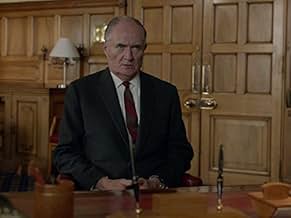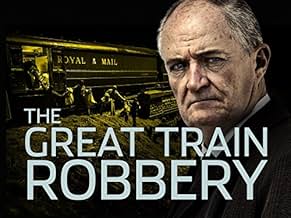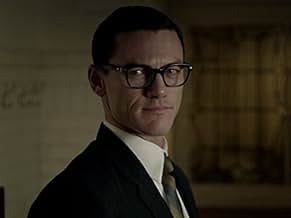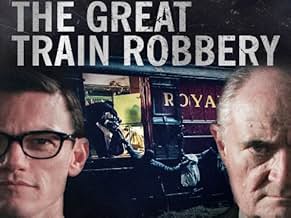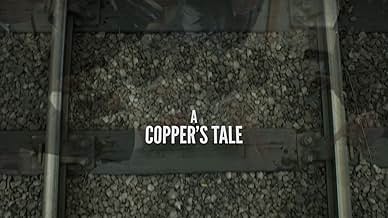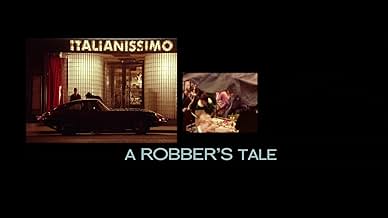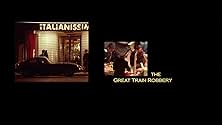IMDb RATING
7.3/10
5.3K
YOUR RATING
A two-part drama which portrays The Great Train Robbery of 8 August 1963, firstly from the point of view of the robbers and then from the point of view of the police who set out to identify ... Read allA two-part drama which portrays The Great Train Robbery of 8 August 1963, firstly from the point of view of the robbers and then from the point of view of the police who set out to identify and catch the robbers.A two-part drama which portrays The Great Train Robbery of 8 August 1963, firstly from the point of view of the robbers and then from the point of view of the police who set out to identify and catch the robbers.
- Nominated for 1 BAFTA Award
- 4 nominations total
Browse episodes
Featured reviews
This almost documentary style film made for interesting viewing, and this may have been Luke Evans' first leading role, and he grabbed the opportunity with lots of panache. As the leader of the band of robbers who pulled off the heist, I had some difficulty in focusing on who he was as Buster Edwards and Ron Biggs were always better known. The film however did show that this was a big gang of thieves, and this probably led to their undoing. The actual heist took up little screen time, the rest dealt with the dynamic between the gang, and the motivation of the ringleaders apart from the usual greed, is clearly shown. I enjoyed it, there was always the feeling that this was a gang who were in over their heads, and there is one telling moment when they realize it after counting the money.
The early sixties setting with its talk of the war years and exploits of that time is well realized, making this a series to be enjoyed. Martin Compston had a small but significant role as well.
The second instalment is just as fascinating when you are given the opportunity to see the trail of clues the gang left behind them in the old farmhouse, even after 'apparently' cleaning up! A restrained but driven Jim Broadbent gives the sense of urgency the Police felt about solving this crime, and it says much about the actors concerned, that you almost wanted the robbers to get away with it! Perhaps that explains the success of later series like Money Heist which focus on that.
The early sixties setting with its talk of the war years and exploits of that time is well realized, making this a series to be enjoyed. Martin Compston had a small but significant role as well.
The second instalment is just as fascinating when you are given the opportunity to see the trail of clues the gang left behind them in the old farmhouse, even after 'apparently' cleaning up! A restrained but driven Jim Broadbent gives the sense of urgency the Police felt about solving this crime, and it says much about the actors concerned, that you almost wanted the robbers to get away with it! Perhaps that explains the success of later series like Money Heist which focus on that.
I managed to watch this on Amazon prime.
It's nothing to get overly excited about. The over the top cockney accents can get a bit annoying at times. And the acting from some is a bit wooden. But all that being said I did still really enjoy this. You just have to go in to it with the right attitude. Still well worth a watch if you are looking for something easy to follow to kill a few hours. Enjoy.
It's nothing to get overly excited about. The over the top cockney accents can get a bit annoying at times. And the acting from some is a bit wooden. But all that being said I did still really enjoy this. You just have to go in to it with the right attitude. Still well worth a watch if you are looking for something easy to follow to kill a few hours. Enjoy.
Since the story based on real events is known, I expect the film to be a little more than a purely chronological sequence of the plot. In addition to Luke Evans, the actors are not very prominent and join the monotone pattern. The film could have been more, but in the end it is a boring TV production in my eyes. And after all two long
In 1963, 75 km (46 miles) north of London, about 17 blokes pinched a train with a coach containing millions of pounds of cash being transported via Her Majesty's Royal Mail. It was the biggest heist in British history in which the perpetrators lifted about £2.6 million (about £50 million in today's money or $80 million). Because of the amount of money which was taken from the British government instead of a private party, an all-out investigation ensued. Eventually, about 2/3rds of the members were arrested and sent to prison. Since the heist many films and references to the heist have appeared in popular culture, including a line in the Beatles' film "Help" in which Lennon asks a Scotland Yard detective how the heist investigation is coming.
The current film, a made-for-television miniseries in 2013, is probably the best screen adaption of the heist, presenting the events in two parts. The first is from the point-of-view of the criminals, called "A Robber's Tale", and the second from the view of the investigators called "A Copper's Tale". Both segments are equally compelling with outstanding actors showing us how the crime is viewed from different sides of the railroad tracks, so to speak. Two sets of casts are used for each segment, until the very end of the second segment in which characters from both segments begin interacting.
Bruce Reynolds (Luke Evans) is the mastermind and leader of the heist. Their first large job, an airport heist in 1962, yields not nearly as much in cash as they had hoped, around £65,000 (about £1.25 million or $2 million today, which seems like a lot of money!). They were hoping for a bigger payoff. Through a tip, they discover a train bound for London from Glasgow, Scotland, contains a coach designated as Her Majesty's Royal Mail. In addition to the typical mail, the car also contains sacks of cash, pound notes probably being taken out of circulation. Reynolds resolves to pilfer the sacks of cash and puts together a team to engage the heist, including someone who claims he can stop trains. They find an old abandoned farm as a temporary hideout. As events play out, the teams hits unexpected twists in their plan, including the amount of money which turns out, like the airport heist, not to be what was expected...
The second part then chronicles the investigation and eventual arrests of members of the heist gang. Tommy Butler (Jim Broadbent) leads the Scotland Yard investigation. Butler is not only shrewd but uncompromising. He decides the best means for a successful apprehension of the criminals is to keep information close to his chest as his second-in-command Frank Williams (Robert Glenister) points out. He also forces his team to work long hours with little rest. Then the upper echelons of Scotland Yard, probably due to pressure from members of Parliament, decide to release the names and photos of the known perpetrators to the public, much to the objections of Butler and Williams. The releasing of information, as Butler and Williams predicts, leads to disastrous results, further compromising the investigation.
A very enjoyable and well-acted series. Evans makes a good Reynolds, who is not exactly a ruthless criminal but definitely uses rationalization to justify the heist. Broadbent makes a fine Butler, whose aloofness may compromise the success of the investigation. He's tempered by Robert Glenister as Frank Williams who seems the primary voice of reason during the investigation. If you like heist films, this is a real one, and it demonstrates these crimes as not nearly as easy to pull off as you would imagine if you've seen "Ocean's 11".
The current film, a made-for-television miniseries in 2013, is probably the best screen adaption of the heist, presenting the events in two parts. The first is from the point-of-view of the criminals, called "A Robber's Tale", and the second from the view of the investigators called "A Copper's Tale". Both segments are equally compelling with outstanding actors showing us how the crime is viewed from different sides of the railroad tracks, so to speak. Two sets of casts are used for each segment, until the very end of the second segment in which characters from both segments begin interacting.
Bruce Reynolds (Luke Evans) is the mastermind and leader of the heist. Their first large job, an airport heist in 1962, yields not nearly as much in cash as they had hoped, around £65,000 (about £1.25 million or $2 million today, which seems like a lot of money!). They were hoping for a bigger payoff. Through a tip, they discover a train bound for London from Glasgow, Scotland, contains a coach designated as Her Majesty's Royal Mail. In addition to the typical mail, the car also contains sacks of cash, pound notes probably being taken out of circulation. Reynolds resolves to pilfer the sacks of cash and puts together a team to engage the heist, including someone who claims he can stop trains. They find an old abandoned farm as a temporary hideout. As events play out, the teams hits unexpected twists in their plan, including the amount of money which turns out, like the airport heist, not to be what was expected...
The second part then chronicles the investigation and eventual arrests of members of the heist gang. Tommy Butler (Jim Broadbent) leads the Scotland Yard investigation. Butler is not only shrewd but uncompromising. He decides the best means for a successful apprehension of the criminals is to keep information close to his chest as his second-in-command Frank Williams (Robert Glenister) points out. He also forces his team to work long hours with little rest. Then the upper echelons of Scotland Yard, probably due to pressure from members of Parliament, decide to release the names and photos of the known perpetrators to the public, much to the objections of Butler and Williams. The releasing of information, as Butler and Williams predicts, leads to disastrous results, further compromising the investigation.
A very enjoyable and well-acted series. Evans makes a good Reynolds, who is not exactly a ruthless criminal but definitely uses rationalization to justify the heist. Broadbent makes a fine Butler, whose aloofness may compromise the success of the investigation. He's tempered by Robert Glenister as Frank Williams who seems the primary voice of reason during the investigation. If you like heist films, this is a real one, and it demonstrates these crimes as not nearly as easy to pull off as you would imagine if you've seen "Ocean's 11".
I was born any a couple of months after the great train robbery, back in 1963. And I have always been fascinated by it. My dream would be to go on the actual place where it occurred, the Bridego Bridge. I possess nearly every document about it, footage archive and fiction material. The most memorable, of course, remains Peter Yates's ROBBERY, back in 1967, and the other movie starring the actor starring Derrick - sorry I don't remember his name. Some viewers said on IMDb that this feature was not flawless, concerning details specified to UK, for instances trains and cars from this very era. Well, I have never lived in UK, so...But concerning this film, the only thing that annoyed me was the BOAC company heist, at the beginning. These guys are supposed to be professional robbers with a criminal record as thick as a phone book, and they pull the heist without any gloves !!!! Because finger prints, see? Rubbish. For the rest, it is a terrific piece of work, and the character description is absolutely outstanding. I loved the very ending when Bruce Reynolds tells the hard boiled inspector from SY, who chased them in such a raging way all over the years, that he did not do this for money but for "camaraderie" as he actually said, using a french word meaning companionship, brotherhood among friends. An outstanding face to face between those two adversaries. An authentic masterpiece. But it could have shown the several escapes from jail of some of the great train robbers.
Did you know
- TriviaRonald Biggs, one of the last surviving Great Train Robbers, died on 18 December 2013, the same day that this two-part series was first shown.
- GoofsPolice Officers are shown wearing white shirts. In 1963 Constables and Sergeants in all English police forces wore blue shirts. The change to white shirts came in the late 1970s.
- ConnectionsReferences La grande attaque du train d'or (1978)
- How many seasons does The Great Train Robbery have?Powered by Alexa
Details
- Release date
- Country of origin
- Official site
- Language
- Also known as
- 火車大劫案
- Filming locations
- Production companies
- See more company credits at IMDbPro
- Runtime1 hour 30 minutes
- Color
Contribute to this page
Suggest an edit or add missing content




